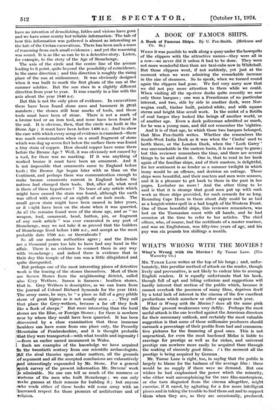A BOOK OF FAMOUS SHIPS.
WHEN it was possible to walk along a quay under the bowsprits of the clippers with the attractive names—they were all in a row—we never did it unless it had to be done. They were not more wonderful then than are taxi-cabs now in Whitehall. But those clippers went, if not suddenly, yet just at the moment when we were admiring the remarkable increase in the size of steamers. So to speak, when we turned round again the clippers had gone. We feel very sorry now that we did not pay more attention to them while we could. When visiting all the up-river docks quite recently we saw only three barques ; one was a Frenchman of no particular interest, and two, side by side in another dock, were Nor- wegian craft, timber built, painted white, and with square sterns and bright blue scroll work. In the midst of a flotilla of coal barges they looked like beings of another world,- or of another age. Even a dock policeman admitted as much, for he was a young man, and did not remember the 'eighties.
And it is of that age, to which those two barques belonged, that Miss Fox-Smith writes. Whether she remembers the South-West India Dock as it was when the Cimba' used to berth there, or the London Dock, when the 'Loch Garry' was unremarkable in the eastern basin, it is not easy to guess ; but this reviewer remembers the time, and there are several things to be said about it. One is, that to -read in her book again of the familiar ships, and of their masters, is delightful, for her sentiment is as tender as a summer twilight in which irony would be an offence, and derision an outrage. Those ships were beautiful, and their masters and men were seamen, and it is a pleasure to get back to them in the past in her pages. Lochaber no more ! And the other thine to be said is that it is strange that good men put up with such work as those ships provided, for such rewards for so long. Rounding Cape Horn in them about July could be as bad as a longish winter spell in a bad length of the Western Front. One of those beautiful ships, this reviewer remembers, was lost on the Tasmanian coast with all hands, and he had occasion at the time to refer to her articles. The chief officer, who, of course, had the certificate of a master mariner, and was an Englishman, was fifty-two years of age; and his pay was six pounds ten shillings a month.










































 Previous page
Previous page